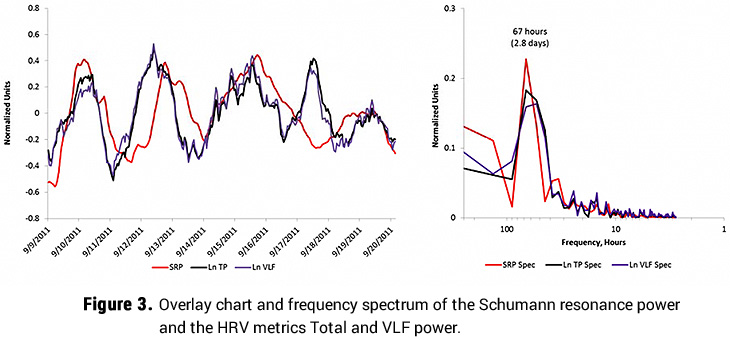
Effects of Geomagnetic, Solar and Other Factors on Humans
"All biological systems on Earth are exposed to an external and internal environment of fluctuating invisible magnetic fields of a wide range of frequencies. These fields can affect virtually every cell and circuit to a greater or lesser degree." – Synchronization of Human Autonomic Nervous System Rhythms with Geomagnetic Activity in Human Subjects, a newly published study in the International Journal of Environmental Research and Public Health.
A research team that conducted the study cited above and published this month added further evidence to the scientific community’s understanding of how human autonomic nervous systems respond to environment influences. In this study, those influences resulted from, among other factors, changes in solar and geomagnetic activity, cosmic rays and the frequencies known as the Schumann resonances.
Led by HeartMath Institute Director of Research Dr. Rollin McCraty, the research team also found that the study participants’ heart rate variability rhythms synchronized remarkably, with one another over the more-than-four-week study period. That was despite the participants all being in separate locations.
"This study was unique," the authors write, "for several reasons: first, it utilized continuous monitoring of HRV (heart rate variability) over a 31-day period in a group of individuals that went about their normal day-to-day lives. Then, by chance, a number of dynamic changes in the solar, cosmic ray, and magnetic environment occurred that allowed the opportunity to examine how the group’s ANS responded to these various changes."
While a central focus of the study was acquiring new data about the effects of the various factors mentioned above on autonomic nervous system activity, researchers hope these and future related findings ultimately can help to benefit human health and well-being.
Why Heart Rate Variability?
HRV is the naturally occurring change in the time intervals between adjacent pairs of heartbeats. It provides an actual physiological measurement of human autonomic nervous system activity and dynamics. So, when participants’ HRV increased or decreased, researchers could make corresponding determinations of how their autonomic nervous systems were being influenced, or changing as well.
One of the findings suggested, for example, that parasympathetic nervous system activity is enhanced during periods of increased solar radio flux (an index that measures solar high frequency radio wave activity) and cosmic rays. (The parasympathetic nervous system, sometimes called the rest and digest system, helps us conserve energy by slowing heart rate, increasing intestinal and gland activity and relaxing sphincter muscles in the gastrointestinal tract.)
The researchers note in their writing that "a previous study also found that an increase in solar radio flux index was associated with lower fatigue, increased positive affect, and mental clarity, while increased SWS (solar wind speed) had the opposite effects."
It is important to understand, as the study explains and HeartMath research has shown, each individual’s level of HRV is critical in their overall health.
"Low levels of age-adjusted HRV indicate chronic stress, pathology, or inadequate functioning in various levels of regulatory control systems in the neuroaxis (the axis of the central nervous system), and is predictive of all-cause mortality.
"Healthy levels of HRV indicate psychological resiliency, behavioral flexibility and capacity to effectively self-regulate and to adapt to changing social or environmental demands, one’s sense of coherence, the personality character traits of self-directedness, and performance on cognitive performance tasks requiring the use of executive functions."
“There were strong positive correlations between cosmic rays and HRV variables, suggesting a beneficial response to increases in cosmic rays.”
Cosmic Rays: Good or Bad?
Among the various activity scientists observed was the normal occurrence of or decline in cosmic rays. Cosmic rays, or CRs are highly energetic atomic nucleuses or other particles that travel through space at speeds approaching the speed of light, 186,000 miles per second. During the early part of this study, there was a sharp decrease in the number of normally occurring cosmic ray counts because of an increase in the solar wind speed, "which appeared to be associated with reduced HRV measures," the study notes. That’s important because, according to a previous study, "There were strong positive correlations between cosmic rays and HRV variables, suggesting a beneficial response to increases in cosmic rays. Other studies have also suggested beneficial effects, at least in healthy populations."
Schumann Resonance Power and Your Heart
The Schumann resonances (SR) are the electromagnetic frequencies of the Earth-ionosphere cavity. Electromagnetic impulses, such as those caused by global lightening flashes, fill this cavity and excite the Schumann resonances.
During quieter magnetic periods Schumann resonance power (SRP) "appears to play an important role in synchronizing people’s slow wave heart rhythms. The potential importance of these rhythms is currently unknown, but (eventually it) may be important to better understand human health and well-being."
While further research is needed to gain a fuller understanding of how SRP affects heart rhythms, the study’s authors state that their findings suggest "a beneficial effect of increased SRP, which was also supported by findings of reduced diastolic, systolic, and mean blood pressure during periods of higher SRP."

Despite any of the various implications of positive or negative effects this study showed the various geomagnetic and solar activity and other environmental factors to have on the participants, the authors qualified the results by noting the following. "It has been found that individuals have different degrees of sensitivity to the Earth’s magnetic fields, and can even respond in opposite ways to changes in the same environmental variable."
“Human regulatory systems are designed to adapt to daily and seasonal climatic and geomagnetic variations; however, sharp changes in solar and geomagnetic activity and geomagnetic storms can stress these regulatory systems, resulting in alterations in melatonin/serotonin balance, blood pressure, immune system, reproductive, cardiac, and neurological processes.”
Click the study to read it in its entirety, Synchronization of Human Autonomic Nervous System Rhythms with Geomagnetic Activity in Human Subjects.

